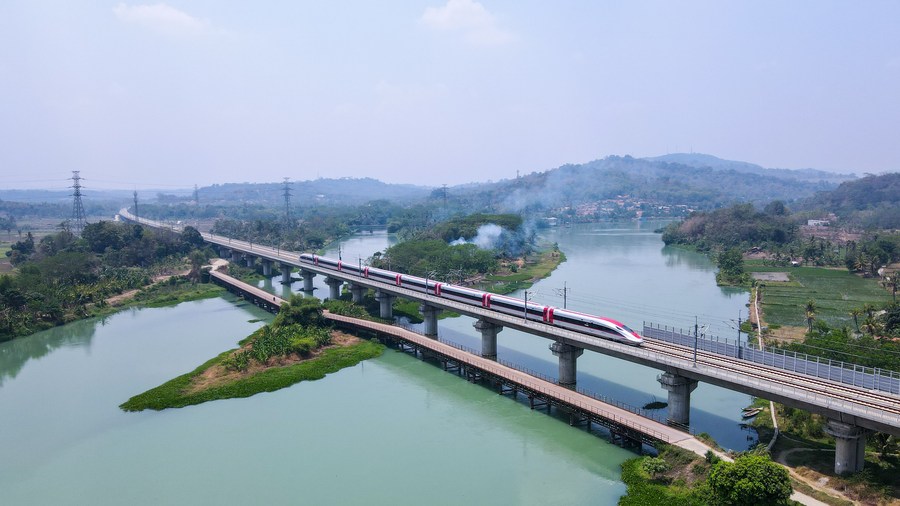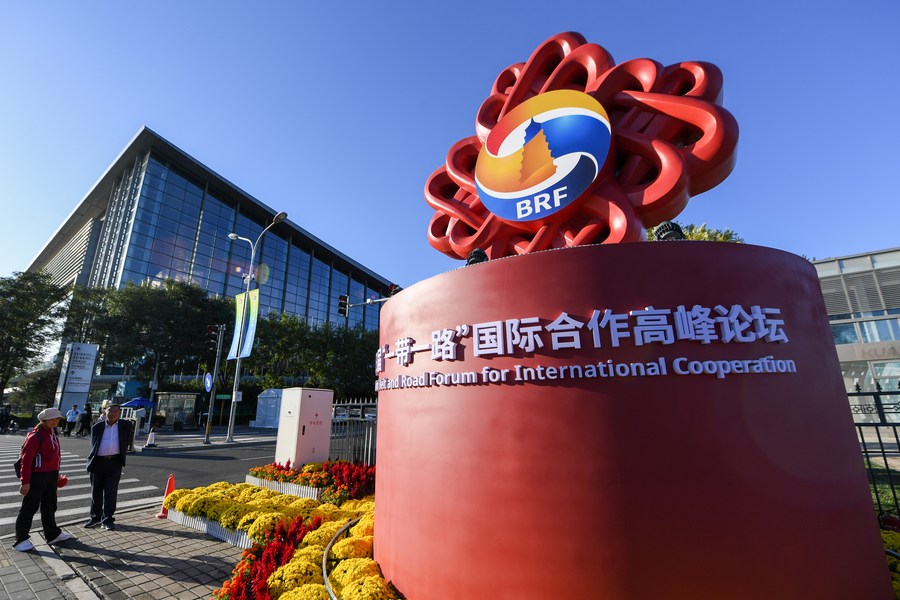(BRF2023) Xinhua Commentary: Belt and Road cooperation to hasten demise of "neocolonialism"

This aerial photo taken on Sept. 30, 2023 shows a high-speed electrical multiple unit (EMU) train of the Jakarta-Bandung High-Speed Railway running in Purwakarta, Indonesia. (Xinhua/Xu Qin)
BEIJING, Oct. 16 (Xinhua) -- As the Belt and Road Initiative (BRI) turns 10 years old, it is clear that the global project of the century has blazed a new development path of shared peace and prosperity.
However, out of jealousy, apprehension or strategic considerations, some Western critics employ derogatory terms, such as "neocolonialism," to describe the BRI in an attempt to undermine China's productive collaborations with partner countries.
The fact is, instead of being a form of neocolonialism, this project the biggest platform for international cooperation is actively expediting the dismantling of "neocolonialism" by bolstering essential independent development capacities of Global South countries. Many of these countries were colonized and remain trapped in the shadow of the neocolonialism of suzerains.
Neocolonialism generally refers to the control that powerful capitalist countries exert over developing countries in fields like economy, finance, ideology and governance, with the aim of sustaining their exploitation of the latter. Eliminating this detrimental legacy is imperative in establishing an equitable and just international order.
Unlike some Western countries, China has never colonized others. Like many countries, it was also a victim of imperialist invasions in its modern history. In its contemporary diplomacy, China treats all countries, big or small, strong or weak, rich or poor, as equal and does not interfere in the internal affairs of other countries.
One must never forget that the paramount tenet of jointly building the Belt and Road is extensive consultation, joint contribution and shared benefits. Extensive consultation is essential in fostering cooperation. Therefore, it is consistently emphasized that the BRI should align closely with the development strategies and plans of partner countries and regions. Project deals are finalized and implemented on the basis of consensus and joint efforts of all parties involved, aiming for high-standard, sustainable and livelihood-enhancing outcomes.
So-called "debt trap" is often cited to support the claims of "Chinese neocolonialism." However, this argument lacks fundamental logic and primarily serves as a political tactic of certain countries to tarnish China's reputation and create divisions between China and its Belt and Road partners.
Developing countries mainly borrow from commercial and multilateral lenders. According to the World Bank's International Debt Statistics, by the end of 2020, commercial and multilateral creditors accounted for 40 percent and 34 percent respectively for the public external debt of 82 low-income and lower-middle-income countries. Bilateral official creditors took up 26 percent and China less than 10 percent.
Debt-trap diplomacy is a typical hallmark of Western powers, whose aid and high-interest loans with political strings attached should be blamed for the excessive debts accrued by some developing countries over the past decades.
Politicized discourse attaching the label of neocolonialism to the BRI is feeble and futile given the growing popularity and distinct success in the first 10 years of this initiative. The China-Laos Railway turned land-locked Laos into a land-linked country, which added over 100,000 jobs indirectly for the country and could raise Laos' aggregate income by 21 percent. The Mombasa-Nairobi Railway accounts for 2 percent of Kenya's economic growth.

This photo taken on Oct. 14, 2023 shows a floral decoration for the third Belt and Road Forum for International Cooperation (BRF) near China National Convention Center in Beijing, capital of China. The BRF will be held from Oct. 17 to 18 in Beijing. (Xinhua/Ju Huanzong)
Building the Belt and Road is a major opening-up move for China in the new era, but it by no means only serves China's development. Rather, it offers other countries a platform to share China's development opportunities to promote shared growth. It values win-win outcomes and rejects one-sided advantages, thus aligning with the essence of creating a community with a shared future for humanity. Seeking sphere of influence or geopolitical interests is not China's purpose in promoting the BRI.
Grandiose ideas proposed by some developed countries have often amounted to mere rhetoric with little substantive action. They indulge in building castles in the air in terms of "support" for developing countries, but China builds roads, ports, industrial parks, technical centers and wind and solar power plants for Belt and Road partner countries.
The BRI is an inclusive and open platform that welcomes all countries to engage in mutually beneficial cooperation for the collective development interests of all. By adopting the "raising geese that lay golden eggs" and "teaching people to fish" approaches, China aims to make a more significant contribution to assisting partner countries in their socioeconomic development so that they can unshackle themselves from neocolonial debt and other traps created by the West.
Neocolonialism and hegemonism lead to nothing but an inescapable dead end. In contrast, the BRI is brimming with vitality as representatives of more than 140 countries gather in Beijing on Tuesday and Wednesday to jointly build fresh momentum and chart a new blueprint on advancing high-quality Belt and Road cooperation in the new phase.
Certainly, challenges and difficulties may emerge during the course of Belt and Road cooperation. The third Belt and Road Forum for International Cooperation presents a significant opportunity for leaders and representatives to reflect on the productive past decade and deliberate on plans for a new decade of even greater productivity.


